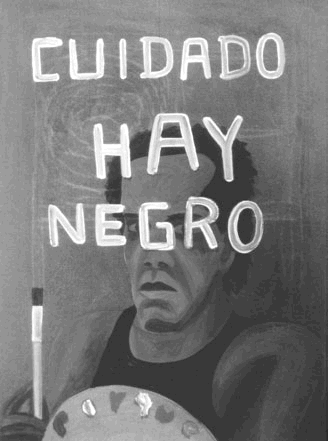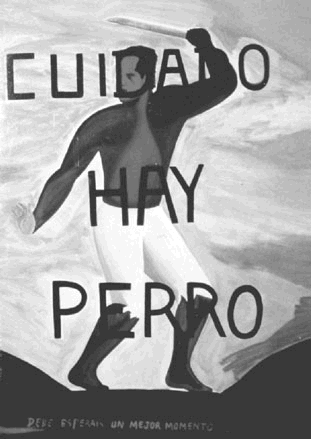

 |
AfroCubaWeb
|
 |
José Manuel Arenas1964 Havana, Cuba. Lives in Nîmes, France, and Madrid, Spain. |
 |
 |
|
The New Afro-Cuban Cultural Movement and the Debate on Race in Contemporary Cuba 12/4/2008 Journal of Latin American Studies: "The image of the black predator has also been important to Manuel Arenas, who ridicules the association between race and crime, so important to some of the rap musicians mentioned above. In his Cuidado hay negro and Cuidado hay perro, two pieces included in the first Queloides exhibit, Arenas ridicules fears of blacks while discussing the deep roots of this racial discourse in the history of the Cuban nation. In Cuidado hay perro he inserts a fighting runaway slave (or a member of the 19th-century Liberation Army), to illustrate that current racial fears are nothing new in Cuban history. The historical context is reinforced by a text included in the painting : ‘Deve esperar un mejor momento’ (‘He must wait for a propitious moment’). This inscription makes reference to one persistent thread in Cuban nationalist discourse: that blacks must be patient and mobilise only if the moment is propitious (which never is). Arenas further ridicules these historically grounded racist fears in Cuidado hay negro, where the dangerous black male is the painter himself. |
|
www.saatchionline.com/manuelarenas
www.artslant.com/global/artists/show/100006-manuel-arenas
Rafael Lopez Ramos, "La Huella del Latigo" Los Lirios del Jardin 4/19/2011 "Alejandro- Es curioso que menciones el miedo al negro. Pero ese miedo no es colonial, aunque tenga raíces coloniales. Es un miedo vigente y que se refleja de distintas maneras en las obras de algunos de los artistas de Queloides. Es un tema central en la obra de Manuel Arenas, que en los noventa hizo un cuadro muy interesante (expuesto en el Queloides de 1999, organizado por Ariel Ribeaux) que se titulaba, precisamente, “Cuidado hay negro,” un título que, en una especie de remake, él retoma en esta exposición en una instalación que se mostró en la Habana y ahora en The 8th Floor en Nueva York. Es también un tema importante en la obra de Alexis Esquivel."
[AfroCubaWeb] [Site Map] [Music] [Arts] [Authors] [News] [Search this site]